The works recognized by one of Japan's most coveted literary awards, the Naoki Prize, have something new in common: for the first time in 85 years, all six nominated authors are women.
Japan is home to what many consider the world's first novel, "The Tale of Genji," written in the 11th century. Its modern fiction has been defined by Nobel laureates Kenzaburo Oe and Yasunari Kawabata and for decades has been dominated by Haruki Murakami.
Click to Gallery
The works recognized by one of Japan's most coveted literary awards, the Naoki Prize, have something new in common: for the first time in 85 years, all six nominated authors are women.
Last Friday, two women — Natsuko Imamura and Masumi Oshima — were awarded the Akutagawa and Naoki prizes. The prize earns the writers prestige and, increasingly, a clear path to wider audiences through translation.
This Oct. 19, 2018, photo, shows Japanese writer Chisako Wakatake at the Museum of Modern Japanese Literature in Tokyo. Wakatake, 63, won the Akutagawa Prize in 2017 for “I’ll Live by Myself,” a story about a 74-year-old widow adjusting to life alone. She began writing full-time at 55. (Kenichiro KojimaKyodo News via AP)
In this Jan. 18, 2019, photo, Japanese female novelists, from left, Mariko Hayashi, Natsuo Kirino, and Mitsuyo Kakuta attend a literature symposium in Paris. While most of the world associates Japanese literature with male writers, that's changing with a wave of female writers from diverse backgrounds winning top prizes and increasingly being chosen for translation. (Kyodo News via AP)
In this Dec. 10, 1994, photo, Japanese novelist Kenzaburo Oe displays his medal and diploma after receiving the Nobel Prize for literature at the Concert Hall in Stockholm, Sweden. Japan's modern fiction has been defined mostly by long-established male writers such as past Nobel laureates Oe, that's changing with a wave of female writers from diverse backgrounds winning top prizes and increasingly being chosen for translation. (AP PhotoTobbe Gustavsson)
In this Dec. 10, 1968, photo, Sweden's King Gustaf VI Adolf, left, congratulates Japanese novelist Yasunari Kawabata after presenting the Nobel Prize in literature at Concert Hall in Stockholm, Sweden. Japan's modern fiction has been defined mostly by long-established male writers such as Kawabata, that's changing with a wave of female writers from diverse backgrounds winning top prizes and increasing translation. (AP Photo)
FILE - In this Nov. 3, 2018, file photo, Japanese novelist Haruki Murakami signs his autograph on his novel "Killing Commendatore" during a press conference at Waseda University in Tokyo. While most of the world associates Japanese literature with male writers, such as the massively popular Murakami, that's changing with a wave of female writers from diverse backgrounds winning top prizes and increasingly being chosen for translation. (AP PhotoEugene Hoshiko, File)
But Japanese literature is beginning to look different as new voices, including young writers, women and the elderly, receive recognition.
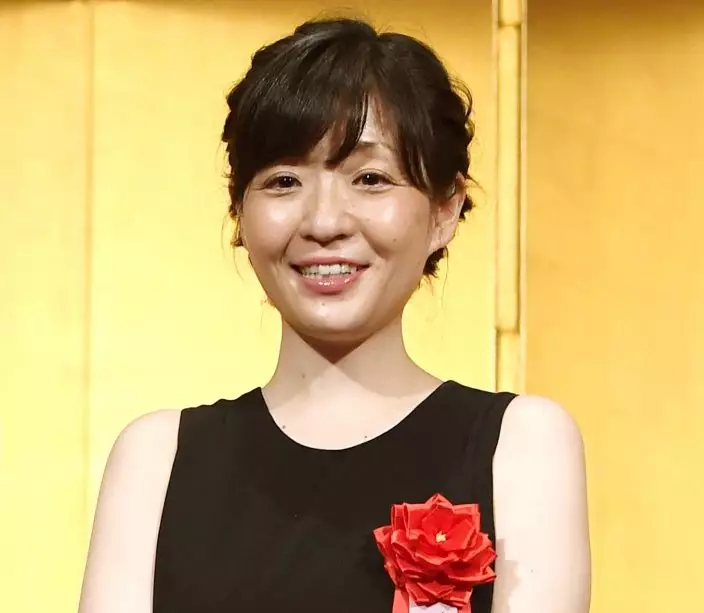
In this Aug. 26, 2016, photo, Japanese novelist Sayaka Murata smiles after receiving the Akutagawa Prize in Tokyo. Murata, then 36, and still working part-time at a convenience store, shared the stage with actress Naomi Watanabe, known as “the Japanese Beyonce,” as one of Vogue Japan’s “Women of the Year.” Two years later, the English translation of Murata’s novel was an editor’s best-of-the-year choice by the New Yorker, the magazine that catapulted Murakami to stardom. (Kyodo News via AP)
Last Friday, two women — Natsuko Imamura and Masumi Oshima — were awarded the Akutagawa and Naoki prizes. The prize earns the writers prestige and, increasingly, a clear path to wider audiences through translation.
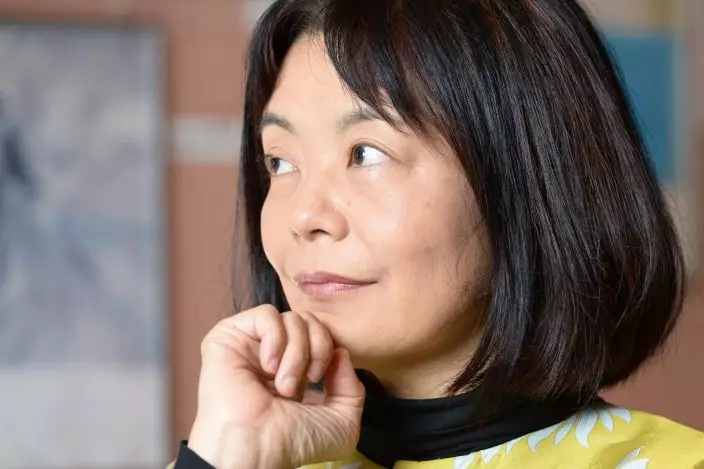
This Nov. 15, 2017, photo shows Japanese novelist Yoko Tawada in Tokyo. Publishers in the United States and Britain are seeing a growing audience for novels in translation, experts say. Translations of half a dozen prize-winning works by female authors from Japan were published last year in the United States, with Tawada’s “The Emissary” taking a 2018 National Book Award for translated work. (Yuka AndoKyodo News via AP)
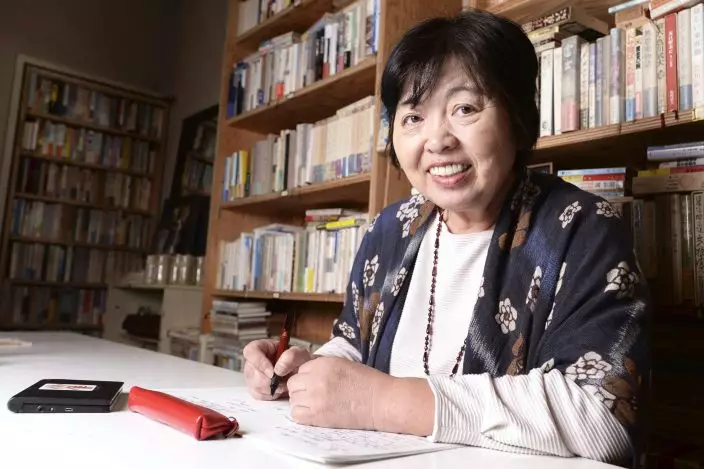
This Oct. 19, 2018, photo, shows Japanese writer Chisako Wakatake at the Museum of Modern Japanese Literature in Tokyo. Wakatake, 63, won the Akutagawa Prize in 2017 for “I’ll Live by Myself,” a story about a 74-year-old widow adjusting to life alone. She began writing full-time at 55. (Kenichiro KojimaKyodo News via AP)
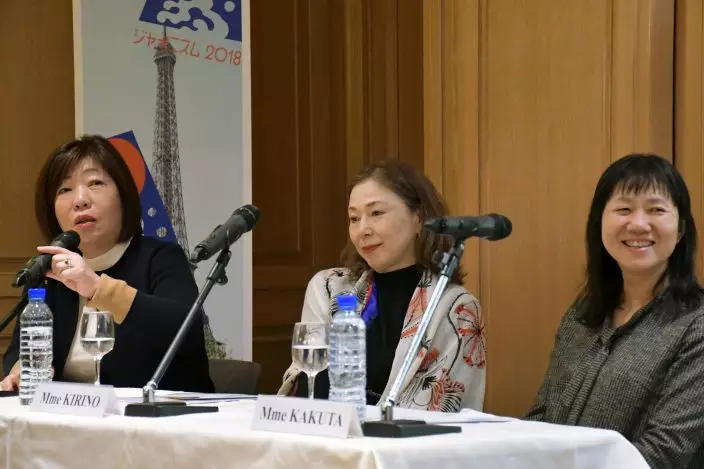
In this Jan. 18, 2019, photo, Japanese female novelists, from left, Mariko Hayashi, Natsuo Kirino, and Mitsuyo Kakuta attend a literature symposium in Paris. While most of the world associates Japanese literature with male writers, that's changing with a wave of female writers from diverse backgrounds winning top prizes and increasingly being chosen for translation. (Kyodo News via AP)
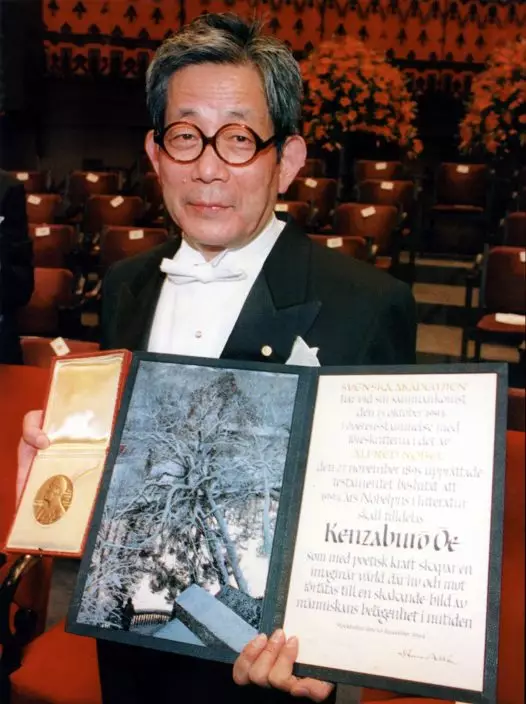
In this Dec. 10, 1994, photo, Japanese novelist Kenzaburo Oe displays his medal and diploma after receiving the Nobel Prize for literature at the Concert Hall in Stockholm, Sweden. Japan's modern fiction has been defined mostly by long-established male writers such as past Nobel laureates Oe, that's changing with a wave of female writers from diverse backgrounds winning top prizes and increasingly being chosen for translation. (AP PhotoTobbe Gustavsson)
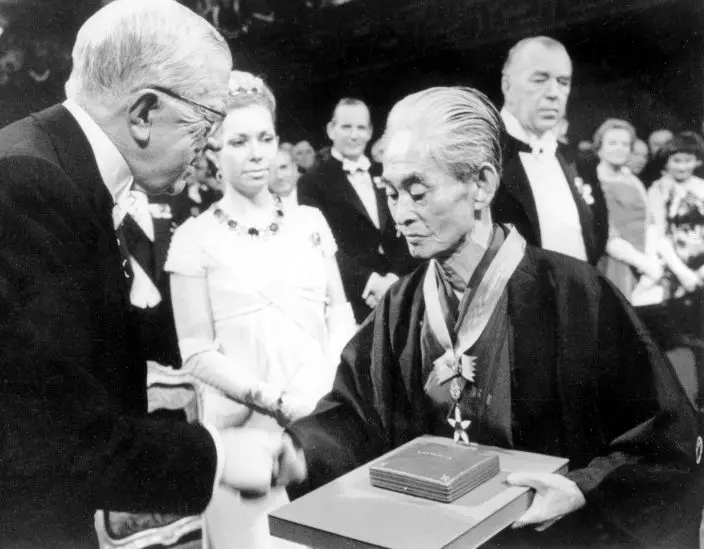
In this Dec. 10, 1968, photo, Sweden's King Gustaf VI Adolf, left, congratulates Japanese novelist Yasunari Kawabata after presenting the Nobel Prize in literature at Concert Hall in Stockholm, Sweden. Japan's modern fiction has been defined mostly by long-established male writers such as Kawabata, that's changing with a wave of female writers from diverse backgrounds winning top prizes and increasing translation. (AP Photo)
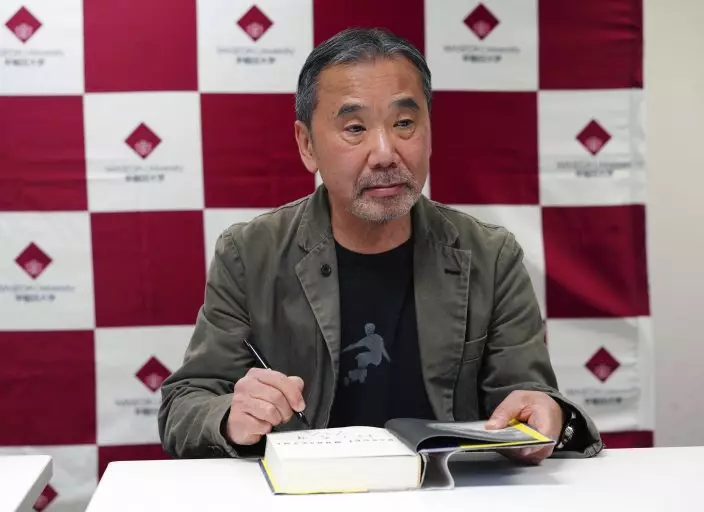
FILE - In this Nov. 3, 2018, file photo, Japanese novelist Haruki Murakami signs his autograph on his novel "Killing Commendatore" during a press conference at Waseda University in Tokyo. While most of the world associates Japanese literature with male writers, such as the massively popular Murakami, that's changing with a wave of female writers from diverse backgrounds winning top prizes and increasingly being chosen for translation. (AP PhotoEugene Hoshiko, File)
DETROIT (AP) — The Oakland Athletics no longer have to wonder where they'll play the next few seasons. That won't make the long goodbye any easier.
The A's reacted to the announcement that this will be their last year in Oakland with a mixture of sadness and relief.
“At least as a player, you know where you’re headed,” outfielder Seth Brown said Friday before a game against the Tigers in Detroit. “There’s obviously a lot of moving parts, a lot of stuff we’re not privy to, so it’s just been kind of a waiting game on our end. Where are we going to go? Where are we going to be? So I think just having that knowledge -- at least we know where we’re going to be playing next year.”
Vivek Ranadivé, who owns the Triple-A Sacramento River Cats, and Oakland Athletics owner John Fisher announced Thursday that the A’s will temporarily relocate to West Sacramento's Sutter Health Park for at least three seasons. The A's are moving to Las Vegas after a new ballpark is constructed.
The River Cats, who are affiliated with the San Francisco Giants, will continue to play at the same facility.
Fisher was unable to reach an agreement with Oakland city officials on extending the lease at Oakland Coliseum, which expires at the end of this season. The A's have played in the city since 1968.
“There's direction now, which we've talked a lot about,” Oakland A's manager Mark Kotsay said. “We've got time to kind of reflect on what this really means from an organizational standpoint, the history that we've had in Oakland, with this being now the final season. There's a lot of emotion that goes behind this.”
It will not only cause some upheaval for the players and staff but also members of the organization that work behind the scenes.
“At the end of the day, we know where we're going to be for the next three seasons after the finish this year and that in itself gives a little bit of stability,” Kotsay said. “At the same time, in the present, it's challenging in certain ways to think about the finality of this organization in Oakland.”
Sacramento will be a much smaller environment to house a major league team. Ranadivé said the River Cats venue currently seats 16,000 when counting the stands, the lawn behind center field and standing room only.
First baseman Ryan Noda is concerned with the facilities. He's hopeful that significant upgrades will be made, much like the Toronto Blue Jays did at Buffalo's Triple-A facility. The Blue Jays played at Buffalo's Sahlen Field in 2020 in 2021 during the COVID-19 pandemic.
“New walls, new dugouts, new locker rooms — everything they needed to become a big league stadium,” said Noda, who played some games in Sacramento as a minor leaguer. “As long as we can do something like that, then it'll be all right. But it's definitely going to be different than playing in stadiums that hold 40,000 people.”
Kotsay is confident the upgrades will occur.
“I know it will be of major league baseball quality,” he said. “It's has to be of major league baseball quality. I know the Players Association will make sure that takes place, as they did in Buffalo.”
For the rest of this season, the A's will have to deal with small home crowds and disappointed fans.
“We’re sad for the fans, the diehard fans, who always come to our games, always support us, always support the boys wearing the jersey,” Noda said.
AP MLB: https://apnews.com/hub/mlb

Sacramento Kings owner Vivek Ranadive, center, shakes hands John Fisher, owner of the Oakland Athletics, before the start of a news conference where Fisher announced his team will leave Oakland after this season and play temporarily at a minor league park, during a news conference in West Sacramento, Calif., Thursday, April 4 2024.The A's announced the decision to play at the home of the Sacramento River Cats from 2025-27 with an option for 2028 on Thursday after being unable to reach an agreement to extend their lease in Oakland during that time. (AP Photo/Rich Pedroncelli)

John Fisher, owner of the Oakland Athletics baseball team, announces that his team will leave Oakland after this season and play temporarily at a minor league park, during a news conference in West Sacramento, Calif., Thursday, April 4, 2024. The A's announced the decision to play at the home of the Sacramento River Cats from 2025-27 with an option for 2028 on Thursday after being unable to reach an agreement to extend their lease in Oakland during that time. (AP Photo/Rich Pedroncelli)

Sutter Health Park, home of the Triple A team Sacramento River Cats, is shown in West Sacramento, Calif., Thursday, April 4, 2024. The Oakland Athletics announced the decision to play at the home of the Sacramento River Cats from 2025-27 with an option for 2028 on Thursday after being unable to reach an agreement to extend their lease in Oakland during that time. (AP Photo/Rich Pedroncelli)

Oakland Athletics manager Mark Kotsay walks to the dugout after making a pitching change during the eighth inning of the team's baseball game against the Cleveland Guardians in Oakland, Calif., Sunday, March 31, 2024. (AP Photo/Jeff Chiu)













